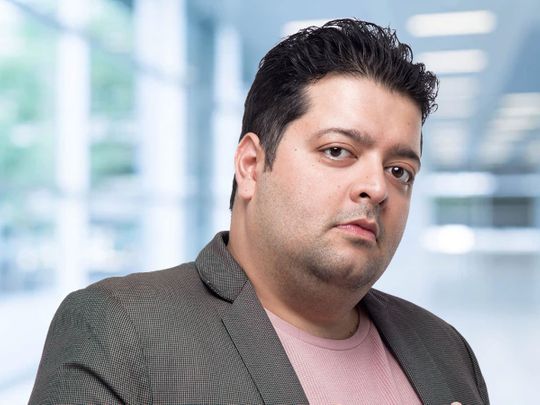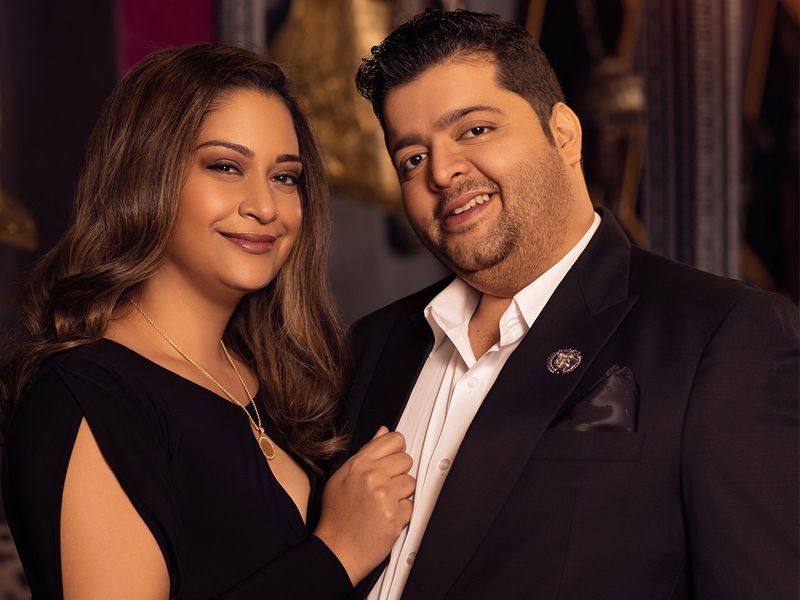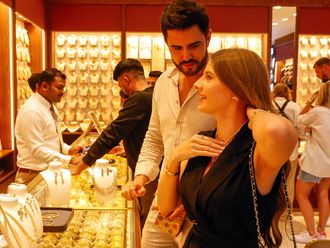
Dubai: UAE resident Osman Osman, 36, was raised in an entrepreneurial community in Pretoria, South Africa, where people had the skill to buy and sell anything they could get their hands on. So, it was second nature for him to have the perquisite skillset for entrepreneurship from his early growing years.
"My mum was a home entrepreneur; she used to sell samosas (fried or baked pastry with a filling) and a South African sweet delicacy called 'koeksusters' on the side of the road, which put us through school."
His first job was when he was ten years old in South Africa. He worked as a part-time van boy for his cousin. "I would help the drivers offload deliveries at the supermarkets. It taught me the art of being disciplined and about starting from the bottom and understanding every part of the business, from operations to invoicing deliveries to management."
Then at school, at age 15, he used to sell cell phones from his school bag. "Many of my friends' fathers were in the cell phone industry, and I used to buy from them and sell them into the local stores and to local foreigners, who were opening stores in the community.
"I was later a business consultant for one of the founders of a franchising business and back in 2002-2003, I was in IT sales."

When I was 17 years old, I officially started in the events industry, organising community fairs and exhibitions on a smaller scale.
When did your passion for working at live stage events begin?
Osman enjoyed going out to live events from a young age. "Post-apartheid, we saw an influx of live events that we would attend. My mum played an integral part in my career – she would buy us the cheapest tickets for these shows, and I would marvel that I didn't want to be the guy on the stage, but I always wanted to be the guy backstage organising these events.
"When I was 17 years old, I officially started in the industry, organising community fairs and exhibitions on a smaller scale. People from the community would visit, bring and sell their products over a weekend enjoy rides, carousels and merry-go-rounds. It was like a carnival for the whole family. It was something I enjoyed doing, I wanted people to come out and enjoy themselves, and since then, it's been 21 years doing this," he added.
“I started a marketing consultancy in 2008, and this was when the passion for entertainment initiated in me. The company ‘Blu Blood’ was started by my wife Shaaista in 2009 when the FIFA World Cup was coming to South Africa, and FIFA and United Nations Children's Fund (UNICEF) signed a contract with her firm, and it was a concierge company back then.”
Osman and his wife decided to merge their companies and built it into a conglomerate when they got married, as their businesses were separately losing out on deals. “So in 2010 or 2011, we decided to take the entertainment path seriously and merged our businesses, forming a company that organises live entertainment, live ticketed events and corporate events," Osman explained.

I started a marketing consultancy in 2008, and this was when the passion for events and entertainment started in me.
When did you start a business in Dubai?
Setting up an entertainment business in the Middle East was always the plan for Osman.
"Dubai is the entertainment capital for the Middle East; it just made sense for us to employ the experience we had gained in South Africa, being a leading producing house. Therefore, we set our business here towards the end of 2019, before the pandemic began," he added.
Their company in South Africa managed some of the region’s comedians, including Tumi Morake and Riaad Moosa, after having created their household comedy brand and touring it across the country for over several years.
They also hosted some India-focused shows across Nigeria, Kenya, Uganda and Tanzania and South Africa, given their popularity in the region, alongside children's shows like Nickelodeon's ‘Dora the Explorer’ and ‘The Smurfs Live’ and a popular South African children's brand called ‘Beautiful Creatures’.
How did you fund the business?
"The company was self-funded by my wife-turned-business partner Shaaista and myself. We made profits with our shows in South Africa, building and growing in the industry. So, we could re-invest in bigger shows and expand the business into Africa and the Middle East."
It was easy for them to navigate in Dubai. They had a well-developed plug-and-play model that they had fine-tuned over the years. (A platform is a plug-and-play business model that allows multiple participants (producers and consumers) to connect to it, interact with each other and exchange value.)

Osman’s three tips to build a business beyond its home base
Tip #1: If you are new in the country, get advice beforehand from contacts or hire a legal consultant for support on formal procedure.
Osman stated that moving with two small children and setting up a new headquarters for a business, already running for several years, was a daunting experience.
"It was beneficial to have partners like Dubai's Department of Tourism and Commerce Marketing (DTCM), who were a backbone in guiding us on what needed to be done, for example, from a licensing point of view."
Osman had also developed relationships with promoters across the region, which helped him get the right advice on setting up business in the UAE. When they started here, the first two pieces of advice they received were 'never to write a cheque they can't honour and build yourself within the market with a good team.'
"There were many initial expenses to consider, such as licensing fees, office setups, visa costs, travel etc. However, that wasn't a considerable percentage of our savings we put in, which was back then Dh300,000. And since we were in a new environment and learning the laws and legalities, we got a law firm on retainer that guided us through all the formal legalities."
"If we had not been able to get guidance from our peers in the industry, then our initial capital outlay would've been much higher. But we had people looking out for us; I think we saved over 10 per cent investment on start-up costs - setting up an office, licensing, and other annual expenses."
Tip #2: Have a professional team's support, as events business cannot be managed alone.
When Osman started in the industry, he had no experience, but he had watched other people doing it over the years and figured out most of the business as he went along.
He faced multiple challenges initially, such as working on profit and loss statements and understanding the dynamics of how integral and personal the business is.
Osman said, "You must put in the hard work and have a team; one person can't do it. In some instances, a show is not selling well at a certain point when you don't have the capital backing and the numbers on paper look great, but you have to realise that not every business or event will be a success.
"My business partner and wife, Shaaista, share the same passion, and we have a fantastic team that comes together and goes through all the hardships and difficulties we face."

Don't risk other peoples’ money if you can't write out cheques afterward.
Tip #3: Never take risks that you can't sustain.
Having come into Dubai in 2019 and experiencing the pandemic, Osman was amazed to see how Dubai got the economy back to booming again. "Our company was among the first within the UAE to start live music events again during the pandemic, and it got us to see things differently, an experience that is second to none.
"My money rule in business is that if you can't take the loss in the venture you are pursuing, or it is something out of your league, and there is no way of recouping losses, then don't do it. Don't risk other peoples’ money if you can't write out cheques afterward."
My mother’s advice: “Never extend beyond your reach.”
Osman remembered that his mum always taught him never to extend himself beyond his reach. "Those were wise words of mum; I have always practised being a young entrepreneur when making decisions and getting in on the deals.
“You have to realise your limitations and understand and review whether the risks are more extensive than rewards or vice versa. It is all about learning and understanding that you can't jump into everything," Osman added.
"When I started as an entrepreneur and starting a business, especially at a young age, I had no savings plan, no strategy, as my focus was on making things work. It was a journey of starting projects and succeeding in some, failing at others, then taking those failures and picking yourself up while still remembering that you had to honour every supplier and deal you made.
"Later in life, when I had other dependents - staff or your family- a sound investment and the saving plan became necessary. I've made investments in many traditional assets like property and within the new realms of shares and cryptocurrencies to secure the business and our future."








